Thrilled at the prospect of hearing Gerald Finley's first performance as Iago, I booked my ticket for this months ago. Having heard Ben Heppner's vocal collapse at Covent Garden, I was concerned at how any tenor would shape up in the title role. I feel that's there only two singers around today I want to hear in this role. One's given it up and the other has not yet embraced the role*.
I heard the scheduled tenor Torsten Kerl in Die Tote Stadt, which somewhat allayed my fears, but I had no great expectations; I was very much focusing on this being Iago the Opera.
On Wednesday my blackberry vibrated with the news that Torsten Kerl had to withdraw, being replaced by Simon O'Neill. With all due respect to Torsten, this was like booking Easy Jet and being forcibly upgraded to First Class on a flag-carrier.
I heard Simon's Florestan at the Proms and knew he has been quite wrongly missing from my life ('didn't you see him as Siegmund a couple of years ago?' someone asked me, and then laughed realising what a ridiculous question that was!).
I wasn't aware that Simon actually had Otello in his repertoire, although I subsequently discovered that he had planned to sing it last year at Salzburg but withdrew, because it was too soon to take on the role.
So, the scene is set. A role debutant as Otello - that role, where nothing is good enough for me, where everything will be compared to El Maestro. A role debutant who was called in at two days notice. It is customary to make allowances for a cover, and especially in such dramatic circumstances. I knew I should be grateful if he merely got through the role without doing a Heppner.
I take my seat, at ground level, right in front of the stage, close to the back row of the first violins, and really not very far from the tam-tam and the rest of the percussion. A woman makes the customary cancellitis announcement from the side, and then a man walks onto the platform who bears an uncanny resemblance to Nicholas Kenyon. I realise it is Nicholas Kenyon, who is there to announce that Colin Davis has just been announced recipient of the Queen's Medal for Music 2009. Colin came on, to rapturous applause, some of it standing, but he was having none of that - it was down to business.
Like all great operas (except Nozze), Otello begins with a storm scene. I only have to hear the tam-tam and my adrenaline is soaring. I marvelled in wonder at the gloriousness of the London Symphony Chorus and I sat back in my seat, ready to take in the proceedings.
I love being at the front, surrounded by the sound of the orchestra, but it has its disadvantages. In this concert performance, the singers retained the same position on stage all night (if they were needed; if not they were off stage).
It's very unlike a Handel opera in concert, where the Baroque orchestra allows for plenty of moving around, and the constant entering-and-leaving. This was the LSO, backed by the LSC, in all their 19th century grandeur, for a very grand 19th century opera, the soloists squeezed in at the front - Otello and Desdemona on my side and all the rest on the far side of the conductor.
This was the major downside of my evening: I never really got a proper view of Gerald Finley; I missed his stage presence and vitality; it was not until the final 'curtain' calls that I could be sure that he was indeed bearded. I also believe that I did not hear his singing properly, which was a shame. Also, I couldn't see the surtitle board, but, believe me, I really can live without it in Otello (although I'm not quite sure of the significance of 'fazzoletto').
I saw Simon preparing for his big entrance, his eyes firmly on the score but never buried in them. And then, Esultate. Never jump to conclusions, but I felt this surge of excitement: someone who sings Esultate like that is likely to be an acceptable Otello. I was entirely won over by the Gia nella notte densa.
I believe I will remember this evening for a long time, and it will certainly go down as one of my 2009 highlights. It's not the first time this year I have gone to hear Gerald Finley and had him outdone in my affections by an Antipodean tenor. That these operas were Peter Grimes and Otello makes this perfectly acceptable and does not diminish Gerald's sterling performance, and, of course, his Dr Atomic was of immense significance at the start of the year.
Sometimes, you come away from a performance with a feeling of 'yeah it was okay but there were all these faults'. Tonight was a night where you know that the details won't stand up to microscopic analysis, but the overall effect was so tremendous that you really don't care.
There was probably more bombast than subtlety coming from the orchestra, which I don't think was purely a result of my lowly seat. There was some exquisite string playing in the second act, and the cor anglais was plangent in the opening to Act 4. It seemed like a good idea to position the trumpets for Act 3 to my left (in Door 1, I think it is, the one next to the door to backstage), and acoustically it worked, but it served only to expose the dodgy notes. I was startled by the boom of the bass drum (is it imitating cannon fire, or the anchor being lowered?).
Of course, I arrived with a lot of baggage and pre-conceived notions of how an Otello 'should' sound. It was surprisingly pleasant to hear a very different vocal interpretation of the role. Some half-time discussion about the timbre of Simon's voice, especially towards the upper end of the range elicited suggestions of 'reedy' and 'sweet', neither of which suffice but are better than any adjective I could find. I finally settled for 'counterheldentenor'. But hey, let's not worry about word pictures; suffice to say he was wonderful.
However much one tries to be objective, it is impossible not to be influenced by the knowledge of the circumstances. I am sure that when I hear the CD I will be more aware of flaws - there has been some speculation about the CD, with Torsten Kerl originally set to do Sunday night's performance despite Thursday's cancellations. But Simon also did Sunday's, according to the Barbican website, so they will have one performance and one spare (which is considered necessary, for patching).
The flaws were not significant. The biggest weakness was the lack of characterisation - this was never a scary Otello in quite the way you expect when watching on DVD. Understandable in a concert performance, with little preparation, with the hall lights on bright. The final act demands darkness.
In the great numbers, it was vocally superb. I writhed in pleasure during Ora e sempre addio; the Sangue sangue sangue Si Pel Ciel Marmoreo Giuro was sublime, two fabulous voices soaring above the orchestra; when I emerged for the interval I wanted to hear it again, maybe just the duet, but, preferably the entire act! As for Nium me tema - oh wow, that was goooood!
I was in a poor position to get the full benefit of the Gerald Finley experience, but it certainly came across as exquisite. I am most familiar with Sergei Leiferkus in this role, who lends a snidey steely quality to the role, which I never expected from Gerald. I have skimmed through several reviews that have asserted that he is no Verdi baritone. As I have never found a satisfactory definition of 'Verdi baritone', I don't really care. He sounded glorious, every note and , every nuance of the libretto and character perfect.
I was undecided about Anne Schwanewilms as Desdemona. It is an attractive and expressive voice with some glorious ringing notes. But, and this is a big but, she sounded spectacularly Wagnerian. Granted, Otello is Verdi's most obviously post-Wagner opera, and that there were some suspiciously Wagner sounding sounds emanating from the orchestra. But her style of singing, which I'm sure is superb in Strauss, in which she is pre-eminent, simply doesn't fit with Verdi. Technically it was excellent, but the legato, the phrasing, the tone were so very Germanic that it seemed strange. I don't suppose it's any weirder than Italianate Wagner, and it's possibly a valid interpretation, but I would have to get used to it before I could properly opine.
There was luxury in depth in the lesser roles. Matthew Rose was his usual dependable self, and stand-out as Cassio was Allan Clayton (the inaugural recipient of the Sir Elton John scholarship at RAM). Allan is dubbed as 'one to watch'. I hadn't even heard of him until I booked next week's Messiah, but on the strength of a well sung, well-characterised Cassio (with some facial expressions which suggested an easy acting ability) I would definitely concur: my anticipation has added 'exciting young tenor' to the excellent Lucy Crowe and Patricia Bardon (unfortunately, Matthew Rose has had to withdraw; I hope James Rutherford performs better than he did last time saw him, in an overall very disappointing Beethoven 9 at The Proms.
But the story of the night, and the justification for Twitter's desperate search for tickets for Sunday's repeat, was Simon O'Neill. A glorious voice who tackled this role with seeming ease. If someone had stepped up as Alfredo at short notice, there would have been shrugs all round, but Otello, the mountain of a role that requires a dramatic tenor and a musician. Many have tried, few have succeeded.
Afterwards I was sitting with friends having a drink in the basement bar and saw Simon walking through with several other people (entourage, I guess, but not in an entourage way). I approached him and thanked him for a wonderful performance. I hope my face showed that I wasn't just sycophantic. I really meant it. Neither of my companions are the types to praise where it isn't due, but they were both full of praise for a remarkable performance (but they don't do star-struckness like I do!). He seems a nice guy, certainly approachable, and down-to-earth. I suspect in years to come, when I'm in my anecdotage, it will be one of those nights where I can say 'I was there!'
I will buy the CD from LSO Live when it released and I shall also buy Simon O'Neill: Father and Son: Wagner Scenes and Arias
This is a few months old but definitely worth a read: Interview with Simon O'Neill
* I do hear that Jonas Kaufmann has offered his first Otello to the Royal Opera House, on the condition he gets a new production.
I saw this on Thursday 29 January, the second performance of the first cast run of the umpteenth revival of the Francesca Zambello production. I have seen it several times before but never starring Gerald Finley. I have rather mixed feelings about Don Giovanni as a work, not least that it can drag, and is probably a bit long at the best of times.
In some ways, Don G is a thought-provoking opera. However, I think there is a limit to how many new thoughts it can provoke, especially in the twentytenth revival. It's a searingly accurate portrayal of a rich privileged empty character, just as relevant today where rich amorality and a rape culture are celebrated too widely in society. And the bewildering behaviour of Donna Elvira, who knows rationally what an utter piece of s**T Don G is, but remains besotted by him.
Gerald Finley was seemingly effortlessly superb as Don Giovanni. There was one phrase in Deh vieni alla finestra, where he appeared to have tuning and/or straining issues, but it wasn't significant and didn't mar an otherwise smooth seamless performance, vocally and dramatically. At the end, before he is dragged into hell consumed by flames, he removes his top, and I was very impressed by the physique of someone a few years my senior.
Overall, it was an enjoyable evening, and I'm looking forward to seeing the alternative cast (including Erwin Schrott as the Don). But I think the ROH needs a new more exciting production, and I can't honestly say it was the most memorable performance ever at the ROH. But significantly more enjoyable than certain performances I've been to in the past 18 months or so!




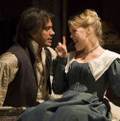

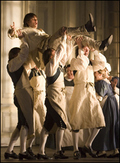
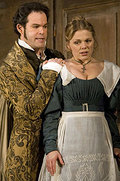
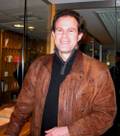
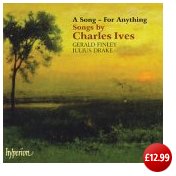
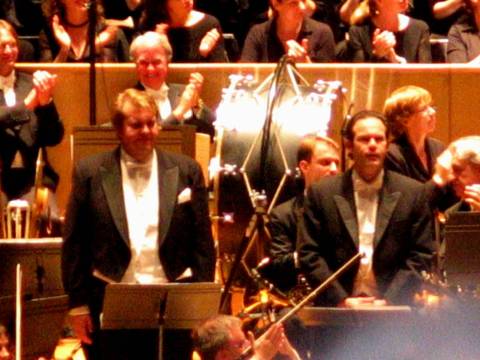
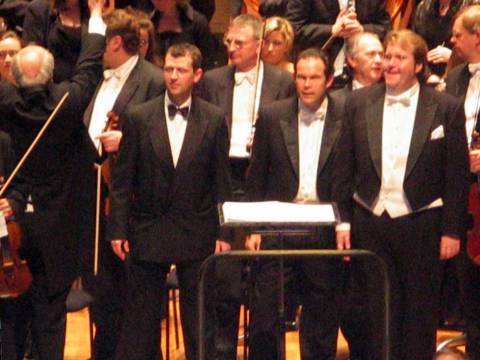



Comments